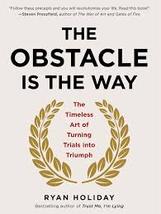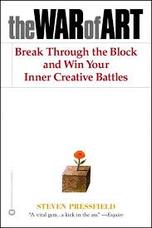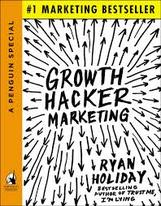 I'm a huge fan of Ryan Holiday's reading recommendations newsletter and his first book, Trust Me, I'm Lying. I was very excited to read his more philosophical third book, The Obstacle is the Way: The Timeless Art of Turning Trials into Triumph, and it turned out to be extremely easy to read, concise, and impactful. Ryan uses his extensive research and reading experience to relate a large number of episodes where historical figures used the strategies of Stoicism to overcome the obstacles they faced. They didn't just overcome their obstacles; they used them to grow stronger and turned them to their advantage. For me this was the coolest takeaway of the book: that it can be (and probably should be) the obstacle that becomes the point of advantage and the source for creative solutions. I was struck by how many successful and pivotal historical figures, like emperors, presidents, inventors, and entrepreneurs explicitly cited Stoicism as their major philosophy. There is a Russian proverb that came to mind when I read the book: "The smart one won't go into the mountain but will go around the mountain." In some ways this is supported by Ryan's book in terms of learning from one's mistakes and trying every possible solution to get to one's goal; in other ways, it is different from what Ryan teaches because many of the lessons in this book recommend specifically finding ways to lean into and flip upside down the obstacles in one's path so they become strengths. These two types of advice are often hard to reconcile: some books recommend building up your strengths and focusing on your core competencies and passions, while other books recommend addressing your weaknesses and working hard to turn them into strengths. Even Ryan's book had lessons supporting both points of view, where some historical figures really reinvented themselves to address their weaknesses and others just focused on what they were good at. Ryan even touched on a similar point when he mentioned that there is this balancing act between persisting and banging on solutions that aren't working on the one hand and learning from one's mistakes and trying totally different things on the other. It's also not unrelated to the perennial pivot vs. persevere choice facing lean startups each time around the Build-Measure-Learn cycle. Overall, I found the major ideas of Stoicism and the general attitudes of appreciating what you have, remembering your mortality, accepting what happens and making the most of it, and looking for the positive whenever you can to really resonate with how I view the world already. I found the book to be enlightening, thought provoking, easy to read, and lots of fun. I now feel really inspired to delve deeper into some of the primary Stoic texts and see how to integrate this philosophy into my own life even more. Tim Ferriss, author of the 4-Hour Workweek, did an excellent interview with Ryan recently as well, which I recommend you check out if you want to learn more.
1 Comment
 Over the past few years, I kept hearing about the book The War of Art: Break Through the Blocks and Win Your Inner Creative Battles by Steven Pressfield. I finally got a chance to read it and highly enjoyed it. Its theme was the battle against "Resistance," this destructive force within us that makes us delay working on the long-term, creative projects that each of us thirsts to work on but keeps procrastinating starting. It provides some refreshingly honest and direct advice for how to battle against this force by being a "Professional," and it outlines exactly what it means by that term. I found the descriptions of how Professionals (writers, artists, entrepreneurs) work and their rituals to be really helpful, and I have indeed seen many of the qualities it mentioned in people I consider to be very effective. I also liked the connections the book drew with classic/ancient wisdom and philosophy. I found the more spiritual/religious tones near the end of the book to be less interesting or compelling though. Overall, this book was a quick, easy, but very powerful read, and it hit a strong chord with me. It's a good book for kicking your butt into gear if you find yourself wishing you could be doing something you're not and wondering why it's so hard to get started on the things you say you're passionate about.  I recently finished reading Ryan Holiday's latest book (which I loved!), but before I post my review and notes of it, I wanted to read and post about his prior book that I hadn't mentioned before: Growth Hacker Marketing: A Primer on the Future of PR, Marketing, and Advertising. It was a very inexpensive and quick read packed with concrete tips and lessons Ryan learned on the job as Director of Marketing at American Apparel. This quick primer essentially took the main marketing lessons from The Lean Startup by Eric Ries and packed them all in one easy-to-digest place. It also reminded me of The Startup Owners Manual by Steve Blank and The Art of the Start by Guy Kawasaki. In a nutshell, the book explains how marketing has become a science focused on data and metrics, and how product development and marketing should not be separate departments or steps of a sequential process but rather one unified whole. It focused on the techniques used by the most successful recent startups, like some of the guerrilla marketing tactics Ryan discussed in Trust Me, I'm Lying. I recommend it for someone who wants a nice refresher about the main marketing points in The Lean Startup and a great overview of the many core techniques used by companies like Dropbox and AirBNB to get their start. |
Archives
June 2024
Categories
All
Subscribe |
 RSS Feed
RSS Feed
